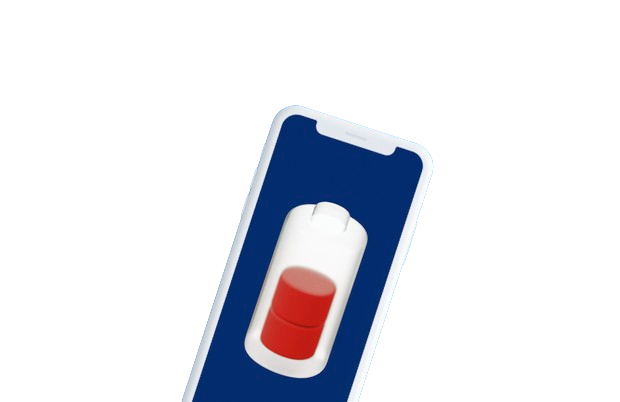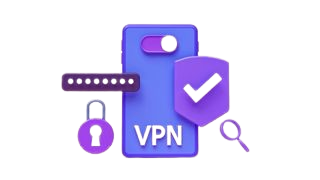Does a VPN drain your battery? [2024]
Last updated on June 6th, 2024 in VPN

Are you someone who values online privacy and security? If so, chances are you’ve heard of VPNs and maybe wondering if does VPN drain your battery. These virtual private networks have become a popular tool for safeguarding your internet activities from prying eyes.
However, there’s a common concern floating around – do VPNs drain your battery? Let’s dive into the truth behind this myth and explore ways to optimize your device’s battery life while using a VPN.
 Imagine your internet connection as a highway full of traffic. Without a VPN, your data is like an open car driving without tinted windows – anyone can see what you’re doing online. But when you activate a VPN, it’s like adding an invisibility cloak to your vehicle, making it harder for others to spy on your digital movements.
Imagine your internet connection as a highway full of traffic. Without a VPN, your data is like an open car driving without tinted windows – anyone can see what you’re doing online. But when you activate a VPN, it’s like adding an invisibility cloak to your vehicle, making it harder for others to spy on your digital movements.
VPNs create secure tunnels that encrypt your data, shielding it from cyber threats and potential eavesdroppers. This VPN encryption process scrambles your information into unreadable code until it reaches its intended destination. By rerouting your connection through remote servers worldwide, VPNs also help mask your actual location and IP address.
In essence, VPNs provide a layer of anonymity and security while browsing the web or accessing sensitive information over public networks. It’s like having a secret agent guarding your online presence against prying eyes and malicious actors lurking in the digital shadows.

Many smartphone users have heard the myth that using a VPN drains battery life faster. But is this really true, or just another tech urban legend? Let’s dig into the truth behind this common belief.
VPN technology works by encrypting your internet connection to enhance security and privacy online. While it may require some additional processing power, the impact on battery life is often minimal. Factors such as the quality of your VPN provider and network connectivity play a more significant role in battery consumption than simply having a VPN turned on.
In reality, modern smartphones are designed to handle various tasks simultaneously, including running a VPN without significantly draining the battery. So don’t let this myth deter you from using a VPN for enhanced privacy and security while browsing the web!
When using a VPN, there are several factors that can impact your device’s battery life.
One key factor is the encryption process that the VPN uses to secure your connection. This process requires additional computational power, which in turn can drain your battery faster.
Another factor to consider is the server location you connect to through the VPN. Connecting to a server that is far away from your physical location can result in increased latency and more data transfer, ultimately leading to higher battery consumption.
Additionally, background processes and apps running on your device while using a VPN can also contribute to decreased battery life. These processes may be competing for resources with the VPN, causing your device to work harder and use more power.
It’s important to be mindful of these factors when using a VPN on your device and take steps to optimize settings or close unnecessary applications to help preserve battery life.
One way to improve your device’s battery life while using a VPN is by choosing a lightweight VPN app. Opt for one that consumes less resources and has energy-saving features to minimize its impact on your battery.
Another tip is to disconnect from the VPN when you’re not actively using it. This can help conserve power, especially if you’re running multiple apps in the background.
Consider adjusting the settings of your VPN app to optimize performance and reduce battery consumption. Look for options like “battery saver mode” or “low power mode” which can help extend your device’s battery life.
Furthermore, closing unnecessary apps and tabs while using a VPN can also contribute to saving battery power. By reducing the workload on your device, you’ll likely notice an improvement in battery performance.
Keeping your device’s software up-to-date can also help enhance its efficiency and potentially reduce the strain on the battery when running a VPN connection.
HideIPVPN offers a VPN service with military-grade encryption, and high-speed servers with unlimited bandwidth.
Our service comes with shared IP addresses so that your activity can never be tied to one particular user, further protecting your privacy.

We also offer DNS leak protection, a Kill Switch, the latest VPN protocols, and a guaranteed no-log policy.
Every purchase you make comes with a 30-day money-back guarantee.
If you’re worried about your battery life while using a VPN, there are alternatives to consider. One option is to manually disconnect from the VPN when you’re not actively using it. This can help conserve your device’s battery power by reducing the continuous data encryption and decryption processes.
Another alternative is to use a VPN only when necessary, such as when connecting to public Wi-Fi networks or accessing sensitive information. By limiting your VPN usage to specific situations, you can minimize its impact on your device’s battery life.
Additionally, you may want to explore energy-saving settings on your device that can help extend battery life overall. Adjusting display brightness, disabling unnecessary background apps, and enabling power-saving modes can all contribute to preserving battery power while using a VPN.
Remember that balancing security with convenience is key when considering alternatives for managing battery life concerns related to using a VPN. By being mindful of how and when you use a VPN, you can optimize both security and efficiency on your device.
The decision to use a VPN while considering its potential impact on battery life is a personal one. It’s essential to weigh the benefits of enhanced security and privacy against the potential trade-off of slightly reduced battery life.
By understanding how VPNs work, being aware of factors that can affect battery drain, and implementing tips for optimizing battery usage, you can strike a balance between protection and performance.
Remember that there are alternatives available if you find that using a VPN significantly impacts your device’s battery life. Whether you choose to prioritize security or longevity, staying informed and making conscious decisions will help you make the most out of your online experience.